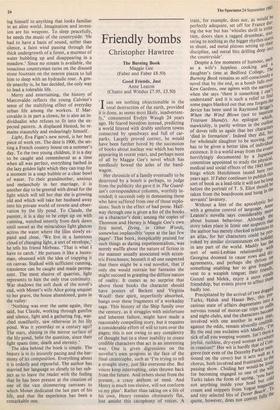Friendly bombs
Christopher Hawtree
The Burning Book Maggie Gee (Faber and Faber £8.50) Good Friends, Just Anne Leaton (Chatto and Windus £7.95, £3.50) can see nothing objectionable in the 1 total destruction of the earth, provided it is done, as seems most likely, inadvertent- ly,' commented Evelyn Waugh 24 years ago. He feared boredom instead, predicting a world littered with drably uniform towns connected by speedways and full of car- parks. Largely proved correct, he would have been further bored by the succession of books about nuclear war which has been appearing in recent years, and perhaps most of all by Maggie Gee's novel which has needlessly bowed the axles of the band- wagon.
Her chronicle of a family eventually to be destroyed by a bomb is perhaps, to judge from the publicity she gave it in The Guard- ian's correspondence columns, worthily in- tended; it succeeds only in demeaning those who have suffered from one of those explo- sions. Such is the effect of bad prose. Half- way through one is given a list of the books on a character's desk: among the copies of Thomson and Hersey is Maggie Gee's own first novel, Dying, in Other Words, somewhat implausibly 'open at the last few pages'. That book, inexplicably praised for such things as daring experimentalism, was merely waffle about the nature of fiction in the manner usually associated with eccen- tric Frenchmen; beneath it all one suspected that there might be a real novelist, that if only she would restrain her fantasies she might succeed in grasping the diffuse nature of reality. It comes as no surprise that above those books the character should have posters of Beckett and Virginia Woolf: their spirit, imperfectly absorbed, hangs over these fragments of a workaday saga. This history of the Ship family over the century, as it struggles with misfortune and inherent failure, might have made a reasonably compelling story, but it requires a considerable effort of will to turn over the pages; this is not owing to any complexity of thought but to a sheer inability to create credible characters that act in an interesting way. One is given digressions on the novelist's own progress in the face of the final catastrophe, such as 'I'm trying to tell a straight story, just like everyone else. But voices keep interrupting, cries thrown back from the future. And others shout from the present, a crazy anthem of need. And Henry is much too elusive, will not conform to my plan'. Rather than taking on a life of his own, Henry remains obstinately flat, lost amidst this cacophony of voices. A
train, for example, does not, as would be perfectly adequate, set off for France dur- ing the war but has 'whistles shrill in irrita- tion, doors slam a ragged drumbeat, stut- tering to nothing as the bigger rhythm starts to shunt, sad metal pistons setting up their discipline, sad metal bits drilling deep into the countryside'. Despite a few moments of humour, such as a wife's hopeless cooking and a daughter's time at Bedford College, The Burning Book remains so self-consciously a novel that by the end, as a bomb falls over Kew Gardens, one agrees with the narrator when she says 'there is something I 011'1 understand' and it is such a relief to fin" some pages blanked out that one forgets the device has been used in Raymond Briggss When the Wind Blows (not to mention Tristram Shandy). An epilogue which, mawkishly, is partly written in the outline of doves tells us again that her characters 'died in formation'. Indeed they did, but for wholesale slaughter to be moving, one, has to be given a better idea of individual existence. It is a world away from the events horrifyingly documented by a Japariesie committee appointed to study the physical' medical and social effects of the 1945 bom- bings which Hutchinson issued here tvi,° years ago. If Faber continues to publish the sort of book as a lead-title it will not be iong before the portrait of T. S. Eliot should be taken from the boardroom and hung in /he servants' lavatory. Without a hint of the apocalyptic Net with a genuine control of language, ore Leaton's novella says considerably In%le about human behaviour. Although LI, story takes place in Izmir one suspects tiT., the author has merely checked referencestP an atlas, for her characters could h°be Ig; yoked by similar circumstances on It the in any part of the world. MaddY has .th sort of semi-Lesbian relationshipdis Georgina doomed to cause rows and on agreements, and perhaps she thrives ot something enabling her to give frequAs, vent to a waspish tongue; the frien",,,, Gunzel and Melek, enjoy a more ts.ttehaeuin friendship, but events prove to affec- badly too. dogged Precipitated by the arrival of two dog re, Turks, Haluk and Hasan Bey, this Po a carious state of affairs degenerates into „s nervous round of motor-car trips to cafes and night-clubs, and the characters becTP,,t, involved with one another in waYs to° against the odds, remain absurdly credible. By the end one exclaims with MaddY, sick of all you weeping women. Isn't thetireefae joyful, ruthless, dry-eyed woman any Cop. in creation?' Her wit is hardly that of L., greve (nor even of the Dorothy parker. as a chorus, both involved and frustratewdel, it° the tioned on the cover) but it acts
t passing show. Chiding her would-be
Wily becoming engaged to one of the have Turks takes the form of saying, 51 cold not anything inside your head but aziue cream and snippets from Vogue a ifi/1, To and tiny selected bits of Dover BefIC,„, the quote, however, does not convey ftw7 Way in which Good Friends, Just briefly and Plausibly describes the erratic behaviour which the delicate security of human relationships has to endure. Anne Leaton is under no illusions about men's chivalry nor are her women in the least vir- tuous, but she does not entirely lose one's sympathy for either sex. If this sounds enough to make some of the columnists further on in these pages wince, there is none of the morbidity all too often associated with such a theme; not quite the masterpiece alleged in some quarters, the novella is certainly the fun- niest book of its kind since Rita Mae Bro.vvres Rubyfruit Jungle. One of its best sections is to appear in Adam Mars-Jones's anthology Mae West is Dead, and Chat°. has also issued a 'trade' paperback which should prevent one forgetting to order it at the library. It may well prove popular phatpot to merit the ordinary paperback some of the season's more heavily- Promoted titles will not be able to sustain.







































 Previous page
Previous page